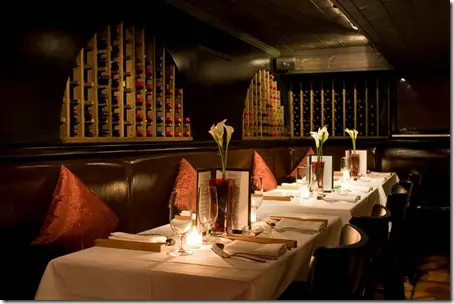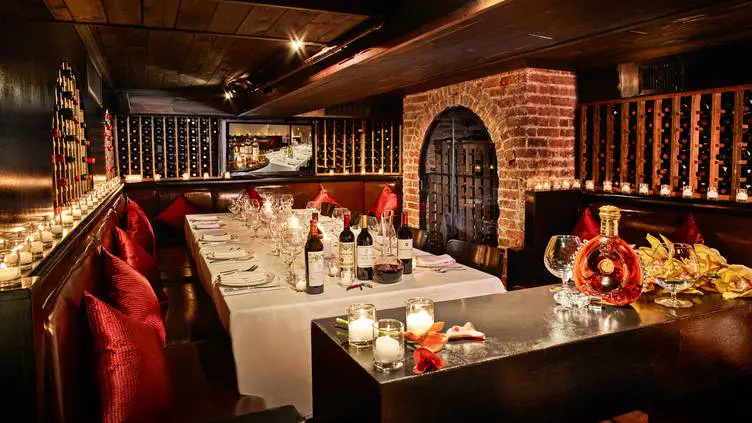The culinary landscape of New York City is no stranger to rivalries, but a recent skirmish involving high-profile restaurants has brought a new flavor to the table. The upscale dining establishments, Philippe Chow and Sei Less, have recently found themselves embroiled in a controversy. Its roots trace back to allegations of corporate espionage and unethical curiosity over menu secrets, prompting discussions and debates in the foodie community. As Restaurant Week approaches, the intensity only heightens, leading to curiosity about how this drama will unfold and affect both establishments.
Philippe Chow, known for its lavish approach to Chinese dining, has recently made headlines not just for its menu, but for its executives being accused of utilizing questionable tactics. As the scandal develops, it’s essential to appreciate the implications for the broader dining culture in New York.
Behind the Scenes: The Rivalry Between Philippe Chow and Sei Less
The rivalry between Philippe Chow and Sei Less is steeped in the complexities of New York’s dining scene. Over the years, both restaurants have gained notorious reputations for not only their culinary offerings but also for their contentious dealings. The alleged espionage incident, where executives from Philippe Chow were accused of snooping into Sei Less’s operational secrets, illuminates the kind of competitive pressures that can prompt unusual behavior.
Understanding the Motivations Behind Espionage
Restaurants operating at the high end of the spectrum often feel immense pressure to maintain not just popularity but also critical acclaim. Philippe Chow has thrived for years on its reputation for exquisite Chinese cuisine, drawing in celebrities and high-profile clientele. Meanwhile, Sei Less, a relatively newer contender, has carved a space in the market, attracting a crowd that craves exclusivity. The threat of poaching lucrative clientele from one another leads to aggressive tactics that sometimes blur ethical lines.
A Closer Look at the Incident
On January 16, a peculiar occurrence unfolded at Sei Less when three notable executives from Philippe Chow dined at the establishment. According to surveillance footage, they were seen taking out their phones to capture images of their dishes, raising suspicions among staff. These actions quickly evolved into probing questions about Sei Less’s menu and its most beloved offerings. This behavior sparked concerns among Sei Less’s staff that the rival team was on a mission to collect intelligence rather than simply enjoy a meal.
The Impact on Restaurant Culture
The blurred lines of competition in the restaurant industry are nothing new, yet the stakes continue to escalate with such tactics. This incident serves as a reminder of the lengths that some firms might go to in an increasingly competitive environment, showcasing how the pursuit of culinary supremacy can sometimes breed questionable ethics.

Media Response and Public Perception
With this latest development, media coverage surged, and public interest escalated around the saga unfolding between Philippe Chow and Sei Less. For food enthusiasts and casual diners alike, the intrigue surrounding high-stakes competition in the culinary industry shines a light on the broader implications of consumer choices. As both establishments navigate the fallout of this incident, it begs the question: how much influence does public perception have on a restaurant’s success?
Analyzing Media Coverage
Various outlets have reported on the incident, amplifying the narrative and stirring public opinion. From discussions on social media to detailed accounts in print, the story has morphed into a broader commentary on New York City dining culture.
Consumer Reactions
Diners who frequent these establishments often hold strong opinions about the ethical practices employed by the restaurants they support. The potential exposure of unethical behaviors may lead to a decrease in patronage for Philippe Chow, particularly if guests feel that their dining experiences could be tainted by underlying tensions rather than genuine hospitality.
The Role of Reputation in the Dining Landscape
In any culinary scene, reputation can be equated with currency. For established brands like Philippe Chow, maintaining a flawless image is essential for continued success. On the other hand, up-and-coming restaurants like Sei Less are considerately building their identity and customer loyalty based on the authenticity of their offerings.

Responses from Restaurant Executives
As tensions rose, reactions from executives at both restaurants offered insight into their perspectives on the unfolding drama. Statements released highlight the delicate balance between competition and professionalism, particularly in a city where the dining scene is often seen as a cutthroat battleground.
Philippe Chow’s Response
James Belakh, Chief Operating Officer at Philippe Chow, defended the actions of the executives by clarifying their intent during the dinner. He expressed that snapping pictures is a common practice when visiting new establishments and that any inquiries about dishes were misinterpreted. This perspective seeks to frame their actions as innocent curiosity rather than corporate espionage.
Sei Less’s Stance
In sharp contrast, Sei Less co-owner Dara Mirjahangiry articulated his discomfort with the incidents. Mirjahangiry emphasized that while they welcomed inquiries, any probing about recipes was unwarranted. He further noted the importance of maintaining a professional boundary between competitors.
The Impact of Statements
Media interpretations of these statements significantly influence public perception. Headlines that deem Philippe Chow’s tactics as questionable can paint a lasting impression on readers. In an industry where reputation plays an essential role in consumer loyalty, one misstep could reverberate through the entire business landscape.

Legal Implications and Future Prospects
The unfolding drama may have broader implications beyond public opinion and customer loyalty. Legal ramifications loom over the incident, reflecting the larger narrative of intellectual property rights in the gastronomy industry. As past disputes emerge, questions about boundaries and ethical practices reign supreme.
The Shadow of Past Litigations
This scandal echoes a previous legal battle where Philippe Chow faced scrutiny over allegations of recipe theft from another high-end restaurant, Mr. Chow. That case became a landmark ruling in the industry, solidifying the importance of protecting unique culinary practices. While the recent allegations may seem less dramatic, they highlight an underlying concern within the sector regarding respect for proprietary information.
Future of Philippe Chow and Sei Less
How both restaurants navigate the aftermath is vital. Will Philippe Chow effectively distance itself from these accusations? Can Sei Less enhance its reputation as a defender of culinary integrity? The coming weeks will be critical in determining the direction for both parties.
Looking Ahead
The resolution of this incident could set precedents for how restaurants compete and interact going forward. It could encourage a more community-oriented approach or perpetuate further rivalry among competitors.

I’m Mikael, a 35-year-old Gossip Gravity Creator. I’m passionate about curating captivating content that sparks conversations and ignites curiosity. Join me on this exciting journey as we explore the fascinating world of gossip and trends together!



